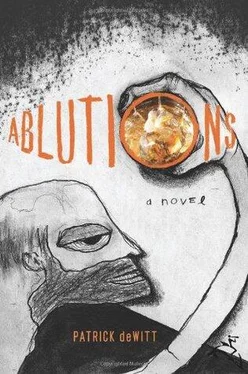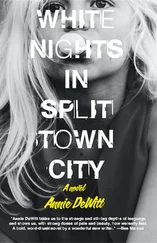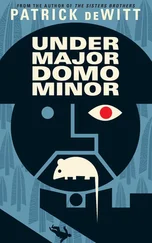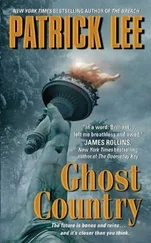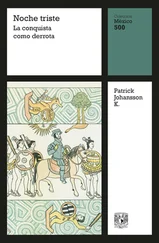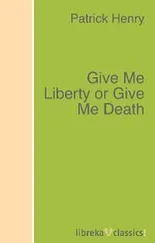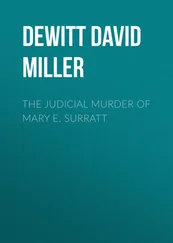Discuss the two previously- and to-be-warring parties. On one side are the brothers and uncles of the deceased. They look like members of the Mafia or anyway what members of the Mafia look like on television and in movies: Large, imposing, masculine, unshaven or lazily shaven, and out of shape. Opposite this group are Simon, Curtis, the child actor, Raymond, Sam, and Ignacio. Ignacio is at the front of the pack and he has his knife out; he is slashing at his impenetrable pants with the blade and saying, "See? You see that? Cocksuckers!" Apparently he is hoping to show that he cannot be hurt or that it will be difficult to hurt him — his eyes are larger, uglier, and crazier than you have ever seen them and you realize that his many stories of violence and retribution were probably half true. But why, you wonder, are these groups at war? You ask a woman at your side and she says, "Those big guys caught the blond bartender eating a hamburger from the table. One of them hit him and then they all went nuts." You look at Simon; he has some remnant of the sandwich clutched in his fist and there is mustard smeared on his cheek, mingling with the blood trickling from his nostrils. He is shivering and has clearly done his fair share of Sam's cocaine but not enough to straighten himself out entirely. He is straddling two worlds, lost somewhere between being overly drunk and overly high, and he does not understand what is happening and you have an urge to help him because you can see that there will soon be more violence and that the bar crew is at a disadvantage in both the size and the sobriety department. Finally you call out to him, beckoning with your hand, and he locates you in the crowd and smiles and waves. Then he looks down and sees the bank bag under your arm, and you suppose he does not understand the precise reason you might be holding such a thing but he does know in his heart that it is incorrect and he makes a move toward you, saying, "Wait. No. Wait a minute. Stop." You back up, looking for an exit, wondering if you will have to fight to remove yourself, but then you see that this will not be necessary because Simon has walked directly into the group of men he was only a minute earlier warring with and they, believing that he is making a hostile advance, knock him to the ground, sending the halved hamburger flying through the air, and the two groups now dog-pile each other, clumsy hands swinging in the smoky semi-darkness.
The crowd pushes in to catch a sharper glimpse of the slaughter, and as the room constricts you sneak away to the luxurious silence of the magical Ford. Your hands and shoulders are shaking from nerves and fatigue but you have the presence of mind to hide the bank bag deep beneath the passenger seat before entering traffic. You drive slowly home; the side streets are empty, the anonymous smaller roads of the slumbering working class. You do not see any policemen and you pat the seat beside you in thanks. You leave the Ford idling in the carport and bound up the stairs to pack a suitcase before writing a note to the landlords with instructions to sell your furniture and enjoy the deposit. You gather your previously and newly pilfered monies together in a pillowcase and return to the Ford to make your lifetime getaway but you discover that this last trip home has used up the car's magic entirely; the engine has seized and will not turn over. You sit in the carport, exhausted, staring at and feeling amazed by the utterly dead dashboard. You return to your house and call a taxi service; the dispatcher says a cab will be there in fifteen to twenty minutes and you thank her and unplug the telephone and place it in the trash can. You return to the Ford to wait. The crickets have ceased chirping. It is that unknown and otherworldly chasm that exists between the nighttime and the day.
The pockmarked counter man is kicking the bottoms of your feet and telling you to wake up. "Wake up," he says. It is seven o'clock in the morning and your face is slick with dew and sweat.
"What?" you say. "What?"
"I'm calling the cops."
"I'm awake, I'm awake," you say, standing up too quickly and nearly fainting. You sit back down. You were asleep atop your pillowcase of money. Your suitcase is at your side. You are in front of the car rental agency.
The taxi driver who brought you here, an African immigrant with deeply black skin and worried yellow eyes, had been curious about you and asked you some questions so as to understand your place in the world.
"But the agency does not open for several hours," he had said.
"That's all right," you told him. "Distance from the scene of the crime is what's important now."
"Scene of the crime," he repeated. His eyes flashed at you in the rear-view mirror.
"I tipped poorly though I knew it was wrong," you explained. "I spoke closely and with bad breath. I drank recklessly, without remorse. I spoke excessively about myself with no regard for truth or the boredom of others." You scratched your face and nodded, agreeing with yourself. "I slept badly but I've lived to tell the tale."
"You are making a joke I think," said the taxi driver.
"I don't know."
"You are unhappy?"
"I have been unhappy," you told him.
"But now is vacation time?" he said hopefully.
"You're a nice man," you said, and he shrugged.
The pockmarked counter man is not so nice, and worse, he remembers you from the last time you were here. His outlook, which was previously poor, seems to have worsened and so you can only assume that his life has worsened. It is sad to think of the daily workings of this ugly, unhappy man, and your head is hurting but you have no aspirin to ease your pain. You ask the counter man for aspirin and he says he has none; somehow you know he is lying to you. So here is the final trial, the renting of a vehicle from a man who does not like you and who will never like you, but whom you must deal with in an efficient manner lest you remain without transportation, which would allow you the freedom to roam and escape, but to where you have not yet decided.
"What's the quickest route out of California?" you ask.
"What?" he asks, tapping the keys of his keyboard. "What?"
"I want a fast car this time," you say. "Forget about the leg-room. I want the fastest, most dangerous car you've got on the lot."
The man leans over and sniffs forthrightly. He asks that you prepare yourself a cup of complimentary coffee, which he has just brewed, and you do, and it tastes terrible. You stand near the brochure display and listen in on the counter man's telephone conversation. He is speaking once more with his regional manager, and once more he is hoping to render you carless, and he speaks of your unpleasant odor and your desire to escape the state of California, and once more the regional manager sides with you, and you understand through the comments made by the counter man that his boss is similarly disinclined toward the Golden State: "Smog, I know, sir. Traffic, yes. Yes, the pollution. Yes, I understand, sir. But this guy …"
It is no use, and the counter man is forced to rent you the car. By the end of your transaction the man is slamming down pens and handling the paperwork with unconcealed malice and you watch him going hatefully through the motions and you feel a distinct pity and sadness for this man, and just after he hands you the key to your new sports car, which you plan to demolish through misuse and overuse, you say to him, "It's none of my business, but I think it might be time for you to switch professions."
The man's face is cold and thoughtless. "It's none of your business," he agrees.
"It's none of my business," you say, "but I think it might be time for you to quit working altogether."
"Quit working and do what?"
"Try to be happy?" you say.
The man is looking into your eyes. You hoped to offer him an alternative to his present, obviously unsatisfactory lifestyle but your words sounded silly and childish, and though you had his attention for a moment you have now lost it and he returns to tap at his keyboard, shaking his head at your foolishness.
Читать дальше
